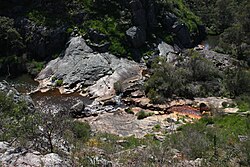| Serpentine River | |
|---|---|
 | |
 | |
| Location | |
| Country | Australia |
| Physical characteristics | |
| Source | |
| • location | Bowerling Hill |
| • elevation | 313 metres (1,027 ft)[1] |
| Mouth | |
• location | Peel Inlet |
• elevation | sea level |
| Length | 111 kilometres (69 mi) |
The Serpentine River is a river in the South West region of Western Australia. It is known as Waangaamaap Bilya to the Indigenous Bindjareb people, who met, lived and fished there before British settlement.[2]
The river rises in the Darling Scarp below Bowerling Hill and flows westward crossing Albany Highway north of North Bannister. The river continues northwest through the Youarling State Forest then the Serpentine National Park. The river flows through Serpentine Dam then flows over Serpentine Falls just south of Jarrahdale as it comes off the Scarp and onto the Swan Coastal Plain. The river continues west and crosses the South Western Highway then flows past the town of Serpentine. The river then veers south and continues until it discharges into the Peel Inlet near Mandurah.
The upper reaches of the river flow into Serpentine Dam, which provides drinking water to the Perth metropolitan area.
The only tributary to the Serpentine River is Big Brook. Additionally, the Peel Main Drain discharges into the Serpentine River at Karnup.[3] The river also flows through Kerulup Pool, Lake Amarillo and Goegrup Lake.
The river is known to have toxic algal blooms, last occurring in 2007. Algal blooms usually occur after hot weather and in the upper reaches of the river.[4]
-
Serpentine Dam
-
Serpentine Falls
- ^ "Bonzle Digital Atlas - Map of Serpentine River, WA". 2006. Retrieved 23 November 2008.
- ^ "Respecting the Serpentine River: Experts discuss the cultural and environmental significance of Mandurah's icon waterway". 2019. Retrieved 26 September 2022.
- ^ UBD Gregory's (2016). "Perth" (Map). UBD Street Directory 2016 Perth & Surrounds (2016 ed.). 1:19,000. St Leonards, New South Wales: Universal Publishers Pty Ltd. pp. 389–497. ISBN 978 0 7319 3006 7.
- ^ "ABCNews - Serpentine River algae may damage health WA". 2007. Retrieved 27 November 2008.

